Why Dogs Lick Their Paws & When You Should Worry

Like cats, self-grooming is also normal for dogs. It's part of their process, especially when they come inside the house after walking around outdoors. But, as with other dog behaviors, excessive paw licking can be an indication that there's something wrong. There can be various reasons behind paw licking, and being familiar with the possible underlying causes can help you gauge whether you need to see a vet or not.
REASONS FOR EXCESSIVE PAW LICKING
- Injury: If your dog focuses on licking just one paw, examine the paw for any injuries present, especially on the nails, between the pads and toes, and at the tops of the feet. Your dog may have stepped on something sharp and irritated his paw, got stung by a bee, walking on a hot surface, or got a blister. Be sure to check the nail area too as nails can get ripped off too. Simple first-aid treatment can often relieve these injuries, while others may need a veterinarian to treat them, depending on the severity.
- Parasites: Parasites such as ticks, fleas, or mange can irritate and itch anywhere on your dog's body, including his paws. These parasites can cause your dog to excessively lick his paws, especially during summer months. In this scenario, it's best to take your dog to the vet to recommend treatments to eliminate parasites, which should relieve the itching.
- Boredom: Such issues are tricky to diagnose, but if you and your vet have ruled out the aforementioned causes, then your dog may be struggling with behavioral issues. Due to these, some dogs can develop compulsive behaviors, which include paw licking. Boredom in dogs is one of these behavioral issues, and likely the easiest to solve. To alleviate it, try taking your dog out for more physical activities. More walks and playtime will use up most of your dog's physical and mental energy. Puzzle toys and chew toys can also help take your dog's focus away from his paws.
- Anxiety: If you've recently started leaving your pet alone for hours at a time, it's possible he could have developed anxiety. Separation anxiety and the fear of loud noises are usually what most dogs suffer from. Read this guide to help you deal with anxiety your dog may face. If you dog develops severe anxiety, consult a vet or animal behaviorist.
-
Allergies: Allergies are common and come from various sources, ranging from environmental, an irritant, or food allergies that your dog comes into contact with. A few signs that your dog may be licking his paws due to an allergic reaction include dark pigmentation, redness, or brown stains on the paws due to constant licking.
- Food Allergies: Usually, food allergies are known to cause itchy paws and are challenging to pinpoint. These often develop when the dog is under a year old. An itchy face and itchy ears may accompany food allergies. In this case, a vet usually suggests either a special diet or the elimination of certain ingredients in your dog's food to alleviate any underlying problems.
- Environmental Allergies: Allergies due to the environment usually form when dogs are 2-4 years of age. They come and go with the seasonal exposure to various allergens and are usually accompanies by an itchy face and rear. After going outside, you should bathe or wipe your dog's paws to reduce the buildup of allergens. Topical creams or sprays with hydrocortisone are usually available for dogs and may temporarily reduce itching. However, for more intense liking, your dog may require systemic medications.
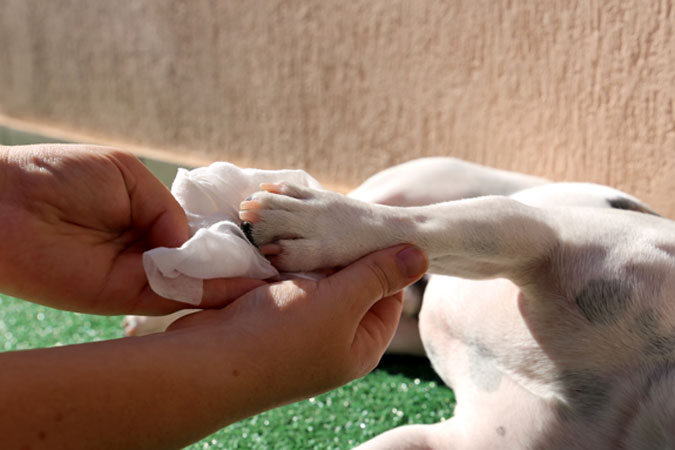
WHAT TO WATCH OUT FOR
- Lick Granulomas: These cause persistent skin irritation and can develop due to excessive licking of the same area on the paw. Synoptic with additional Banamine is a combined anti-inflammatory lotion that can treat lick granulomas. This prescription medication is used to treat the lesion caused by lick granulomas.
- Fur Discoloration: or "saliva staining" is caused by excessive licking, especially in lighter-colored dogs. The fur will then turn a rusty color where your dog is licking.
PROTECTING YOUR DOG'S PAWS
Be sure to regularly check your dog's paws, this way you're able to identify problems early and can quickly treat them. Make sure to examine the paws from the top to bottom as well as the nails, toes, pads, and between the pads. Check for any signs of injury, irritation, foreign objects, or any obvious abnormality.
Also make sure you clean your dog's paws after any outdoor time. Especially if you know your dog already suffers from allergies. Use a baby wipe or wet paper towels to wipe them thoroughly to decrease the amount of environmental allergens on the skin.
If problems persist, speak to your vet. Vets are able to properly diagnose and prescribe any additional medications, if needed. They're also able to make sure there are no underlying conditions that may be causing itchy paws. Observing your dog's habits is helpful, but sometimes it's best to consult your vet too.
CONCLUSION
There are a number of reasons dog's may lick their paws. What's important is that you regularly check your dog's paws and pay attention to when your dog licks their paws. If it becomes excessive, consult your vet for a treatment plan.
Sources:
- https://www.rd.com/article/why-do-dogs-lick-their-paws/
- https://www.akc.org/expert-advice/health/why-does-my-dog-lick-and-chew-his-paws/
- https://thebark.com/content/why-my-dog-excessively-licking-his-paws
- https://www.petmd.com/dog/slideshows/10-common-paw-problems-dogs#slide-1
- https://www.greenmatters.com/p/why-dogs-lick-paws
Previous article
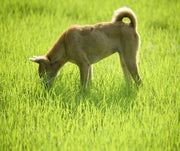
Next article
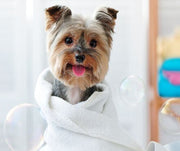
Related posts
View all-
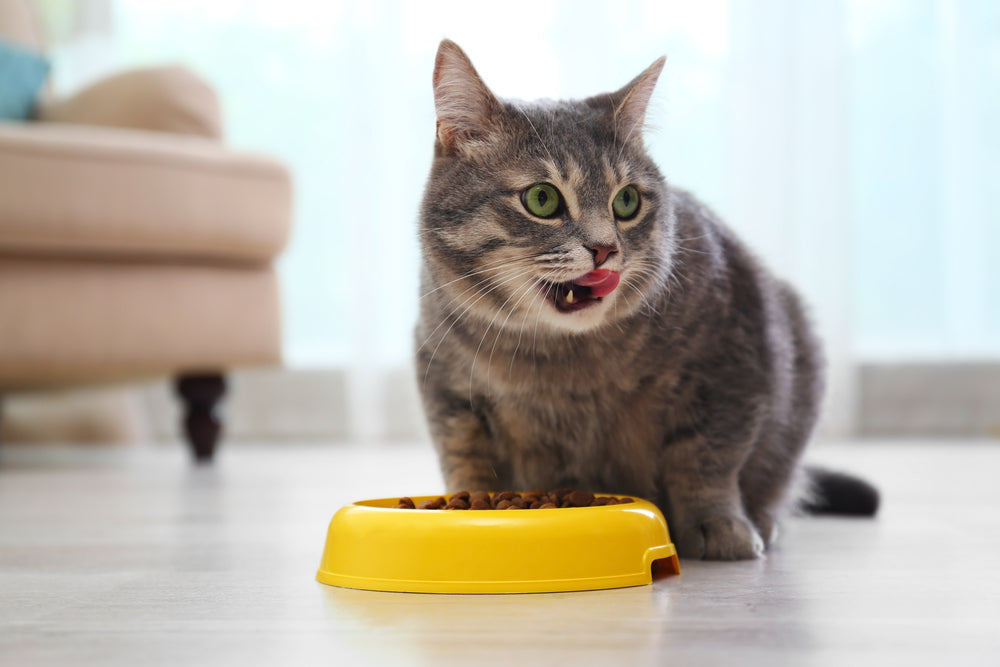
Wet Vs. Dry Cat Food: Which is Better?
As a caring cat owner, you always want the best for your furry friend, especially with their food. You typically have two choices: dry cat food in a bag or canned wet food. Whether you've just brought home a new kitty or are looking to transition to a new food, the decision process can be overwhelming, and understanding the impact of each on your cat's diet is essential. Read Article -
Celebrate National Pet Week: Fun Ideas to Celebrate with Your Pet
National Pet Week is right around the corner, so it's time to plan how you're going to celebrate! While we're sure you celebrate your pet all day every day... Read Article -
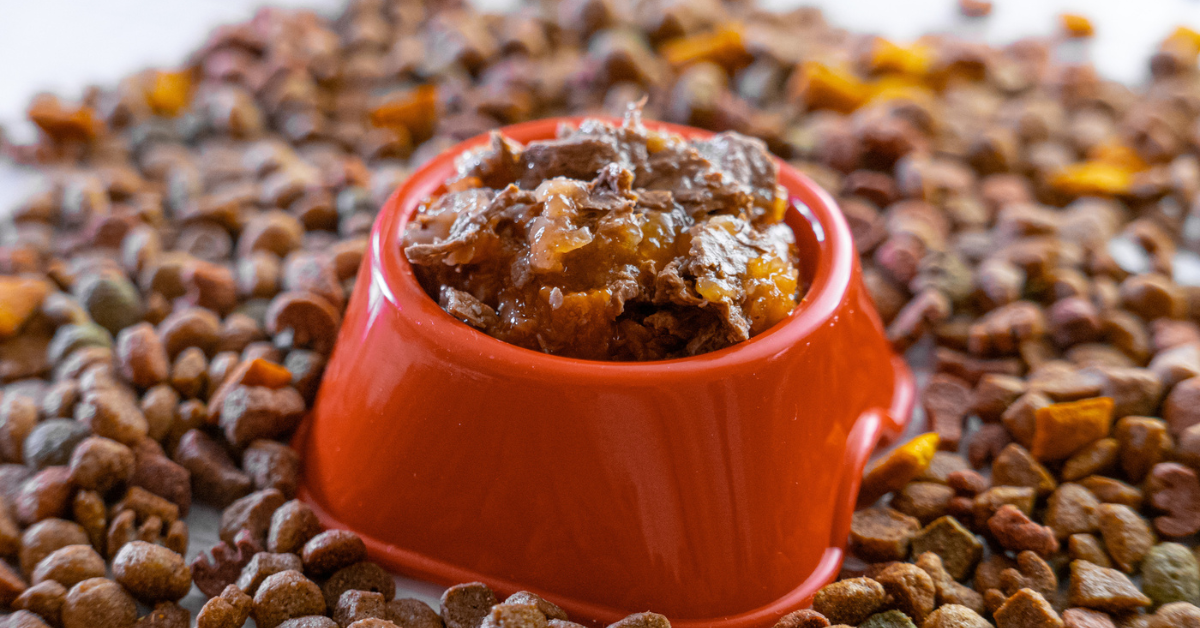
5 Simple Tips to Make Sure Your Cat Drinks Enough Water
Ensuring your cat stays hydrated is important, but it can be challenging since many cats don't drink enough water. Dehydration can lead to kidney disease and other health issues. Fortunately, you can encourage your cat to drink more with a few simple changes. Read Article



